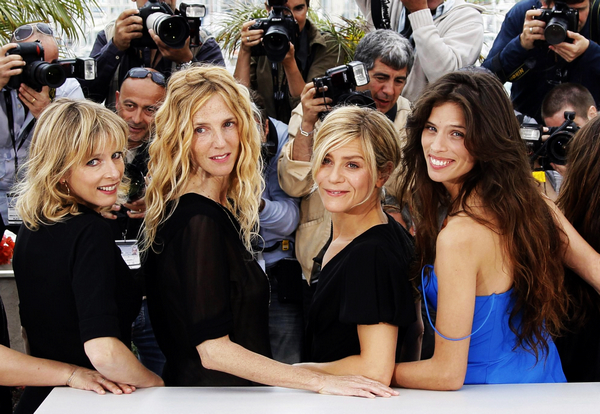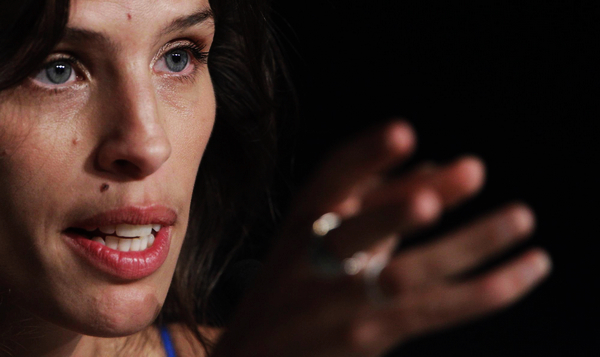Newsmaker
Women grab Cannes spotlight with disturbing tales
(Agencies)
Updated: 2011-05-13 22:18
 |
Large Medium Small |
|
 Director Maiwenn (R) and cast members Karin Viard, Sandrine Kiberlain and Marina Fois (L-2nd R) pose during a photocall for the film "Polisse" at the 64th Cannes Film Festival May 13, 2011.[Photo/Agencies] |
CANNES, France - Female directors, famously shut out of the Cannes film festival's main competition in 2010, dominated the opening of this year's event with dark tales of murder, prostitution, rape and suicide.
Three of four women vying for the coveted Palme d'Or for best picture in Cannes screened their movies to the press in the first two days, and, while dividing critics and varying widely in style, they shared a disturbing vision of the world.
French actress and film maker Maiwenn? was the latest woman in competition this year to present her film "Polisse" on Friday, a hard-hitting drama about a close-knit team of police officers in the Child Protection Unit (CPU).
She followed Australia's Julia Leigh with her debut feature "Sleeping Beauty", about a student who turns to a strange form of prostitution, and Scotland's Lynne Ramsay with "We Need To Talk About Kevin", about a troubled mother-son relationship.
The last of the quartet is Japan's Naomi Kawase with "Hanezu No Tsuki", her third picture in competition.
Film experts said it was no coincidence that more women were in Cannes' flagship selection this year.
"The increased number of female directors in the Cannes competition reflects a growing trend," said Annette Insdorf, film professor at Columbia University who is in Cannes.
"I don't think it is separable from Kathryn Bigelow's Oscar win for 'The Hurt Locker' or Lisa Cholodenko's critical and commercial success with 'The Kids Are All Right."
"Polisse", based on true stories, offers a disturbing glimpse into child pornography, incest, sexual abuse and abandonment, and examines how the police struggle and ultimately fail to separate their personal and professional lives.
The stress of the job, and grim discoveries that are part of the daily routine, create a strong bond between the officers and is a source of often hilarious gallows humour, but it also tests their friendships to the limit.
No quota please?
|
 Director and actress Maiwenn attends a news conference for her film "Polisse" at the 64th Cannes Film Festival, May 13, 2011.[Photo/Agencies]? |
Maiwenn, who also stars in her film as a photographer brought into the CPU to record officers' lives for an official book, ends up in a relationship with hot-tempered yet deeply sensitive Fred, played by French rapper Joeystarr.
"I don't think there's any need really to discuss the status of female directors," Maiwenn told reporters in Cannes.
"I don't think the gender of the director is important at all. I don't think there's any need to have a rule whereby a certain number of women should be in Cannes. I'd hate to think that my film was selected because there was a quota for women."
She added, however, that being a female director on the set was harder than being a male.
The movies returned the Riviera competition to the kind of sombre, uncompromising cinema for which the festival is famous, after Woody Allen's popular comedy "Midnight In Paris" and a host of A-listers gave the event a splashy, upbeat opening.
"The vision of the three films screened thus far has more to do with festival selections than gender: Cannes always tends toward dark, edgy material that reveals the sensibility of an auteur," said Insdorf.
The festival is back in glamour mode at the weekend with blockbuster "Pirates of the Caribbean: On Stranger Tides", which brings Johnny Depp and Penelope Cruz to the red carpet to the delight of hundreds of fans and the 4,000-strong press corps.
Reviews of "We Need to Talk About Kevin", an adaption of Lionel Shriver's bestselling novel about a fictional school massacre, have been generally positive, with Tilda Swinton garnering praise for her portrayal of the tormented mother.
Sleeping Beauty, about a student who agrees to take sedatives and lie naked and unconscious while ageing clients pat, paw and lick her, divided critics.
"Sleeping Beauty strikes me as particularly feminist: despite the abundance of female nudity, it is an austere portrait whose voyeurism is uncomfortable," said Insdorf.
"And a male director probably would not have depicted male nudity the way Julia Leigh does -- as old and flaccid."
| 分享按鈕 |